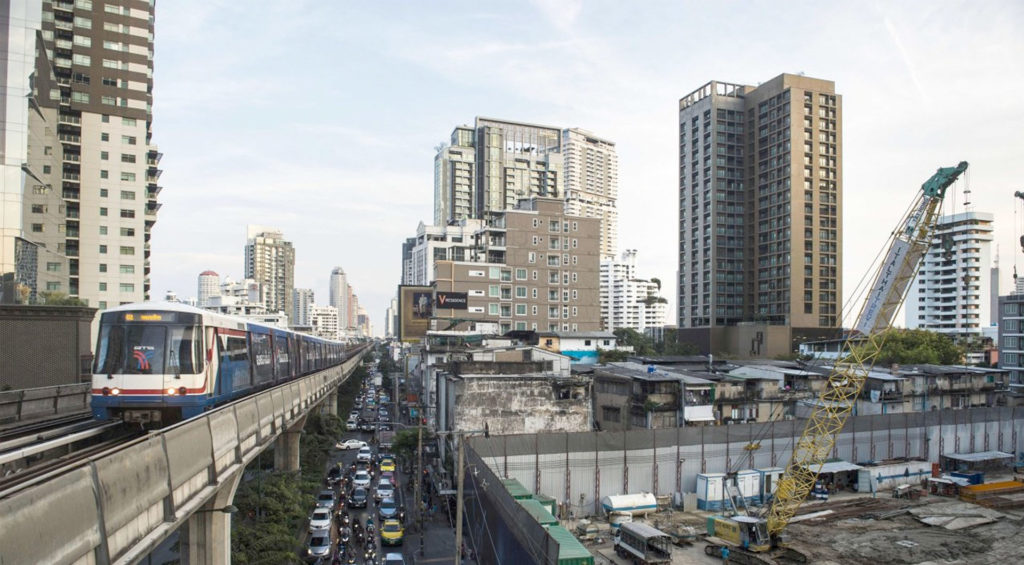24 Dec High-value residential to be main driver of 2019 realty growth in Thailand
Challenges await property developers next year with the Bank of Thailand (BOT) poised to implement a more restrictive regime on mortgage loans starting April 1, along with the recent with a rise in the policy rate, and an expected slowdown of the country’s economic growth, according to realty experts.
“We believe developers will have a hard time next year, given the negative factors affecting the purchasing power of homebuyers. Property firms must rejig their business models with a long-term focus,” said AP (Thailand) Plc’s chief executive officer Anupong Asavabhokhin.
However, he remains confident that the market will still post a 5-per cent growth next year given the strong demand for residential units priced between Bt5 and Bt10 million. This segment will not be badly impacted by the central bank’s measures on mortgage loans – as opposed to speculators and the second-home market, he said.
Origin Property Plc’s chief executive officer Peerapong Charoon-Ek agreed with Anupong’s assessment, saying that the new central bank regime will have little impact on real market demand. He expected growth of up to 10 per cent next year.
“The middle- and upper-income market, priced from Bt5 million to more than Bt10 million a unit, will not be adversely affected by the new regime on mortgage loans and a higher interest rate. However, the impact will be badly felt in the middle- to lower-income segments offering residential units for lower than Bt5 million each,” he said.
Piya Prayong , Pruksa Real Estate Plc’s chief executive officer for market evaluation, said the new loan-to-value measures announced by the Bank of Thailand will weaken demand from both domestic and overseas buyers, especially prospective customers from China. Thus, the company forecasts a market growth of not more than 5 per cent next year.
“To get around the problems, we will adjust our business model with a focus on condominiums. Construction of these projects take longer but the larger timeframe will, in turn, give our customers more time for paying instalments on their down payment,” Piya said. “We will also launch fewer projects next year.”
The Bank of Thailand has announced a set of new measures to rein in mortgage approvals, requiring buyers to place a higher down payment for multi-mortgage borrowings.
From April 1, it will require homebuyers of a third house to place a 30 per cent down-payment, regardless of the price. The first down payment remains unchanged at 10 per cent.
For the second mortgage, the down payment is 10 per cent if the re-payment period of the first mortgage exceeds three years, or the house price is below Bt10 million. The down payment will increase to 20 per cent if the first mortgage is less than three years or the house price is more than Bt10 million.
The Bank of Thailand also raised its policy rate by 0.25 per cent to 1.75 per cent last week amid signs of further increases if the country’s economic growth stays on track next year. However, Thai rates remain lower than other countries’. The US Fed has hiked rates three times this year, causing an outflow of capital from emerging markets to its shores.
Therdsak Thaveeteeratham, executive vice president/research for Asia Plus Securities, said the property market faces slower growth or even a contraction next year as a result of the BOT measures and higher interest rate.
The new regime on mortgage approvals will sap demand in the second- and third-home segments, while the higher policy rate will impact the first-home market, he added.
Therdsak said the Bank of Thailand’s measures will be felt throughout the realty market next year.
The 12 property companies listed on the Stock Exchange of Thailand currently have over Bt500 billion worth of projects under development, of which Bt292 billion are invested in single detached houses and townhouses with condominiums accounting for the balance.
Meanwhile, the total of presale values this year will reach Bt360 billion, the highest in 10 years as the market absorbs higher demand ahead of the slowdown.
Developers are expected to revise their business plans for next year with fewer new-project launches, Therdsak said.

